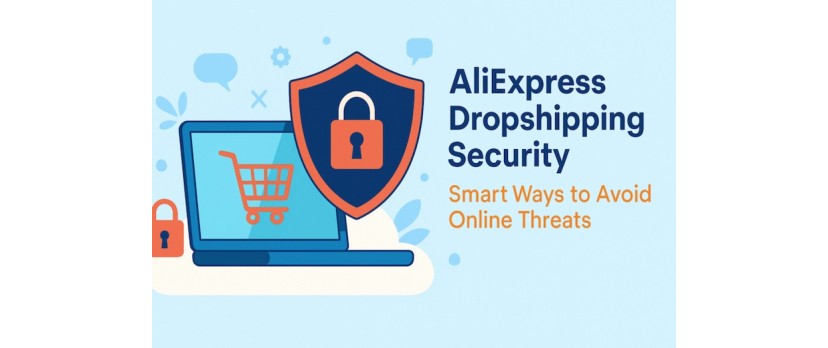You’ve probably been there: you find a hot product on AliExpress, list it in your store, and sales start picking up. Everything feels like it's going great until something goes wrong. A customer files a fraud complaint. Your PayPal account gets flagged. Or worse, your store gets hit with a data breach.
Sound familiar? You’re not alone. Dropshipping from AliExpress is one of the most popular (and profitable) models today. But behind the attractive margins and endless product listings, there’s a hidden world of cyber threats the kind that can quietly drain your profits, damage your reputation, and even take your store offline.
So here’s the deal: if you're sourcing from AliExpress and running an OpenCart store (or any eCommerce platform, really), you need to take cybersecurity seriously.
This article is your guide to doing just that without the jargon, without the fluff. Just real, actionable strategies that protect your store and give you peace of mind.
The Hidden Threats Dropshippers Don’t Talk About
AliExpress is generally safe. Millions use it daily. But when you're running a business and dealing with real customer data, “generally safe” isn’t good enough. You’re responsible for more than just finding good suppliers you’re also managing risk.
Here are the real threats that sneak up on unsuspecting dropshippers:
Fake suppliers who vanish after taking your money.
Phishing emails that look exactly like messages from AliExpress but aren’t.
Data leaks because your store isn’t properly secured.
Payment fraud the kind that looks like a simple chargeback but ends up being a pattern of abuse.
These aren’t hypothetical problems. They're very real, and they happen more often than you think.
So, Is AliExpress Safe for Dropshipping?
The short answer? It depends mostly on you.
AliExpress does have systems in place to protect buyers: refund policies, dispute mechanisms, seller ratings. But these systems aren’t bulletproof. Refunds can be slow. Ratings can be faked. And if you’re talking to suppliers outside the platform (say, over WhatsApp or email), you’re on your own.
For a deeper look at the platform’s credibility, you might want to check out this detailed breakdown on whether AliExpress is actually safe and legit. At the end of the day, AliExpress is just a tool and like any tool, it’s only as safe as the way you use it.
The First Rule of eCommerce Security: Don’t Trust, Verify
You don’t need to be paranoid. But you do need to be careful.
Start by being selective. Don’t just go for the lowest price look for signs of reliability. How long has the supplier been active? Do they respond quickly and professionally? Do their reviews look legit, or are they full of vague five-star ratings without any detail?
It’s also a good idea to avoid doing business outside AliExpress. If a supplier asks for direct payment through PayPal or crypto, it’s usually a red flag.
And yes, even things like enabling two-factor authentication for your AliExpress account or OpenCart dashboard make a big difference. It’s small stuff until it isn’t.
Protecting Your OpenCart Store Like a Pro
Let’s talk about your store. OpenCart is powerful, but out of the box, it's just a foundation. To truly protect your business, you need to add a few key layers.
First: secure your connection. Always use HTTPS (no excuses in 2025). And if you’re logging in from coffee shops, airports, or co-working spaces, a VPN is a must. You’d be surprised how many store logins get hijacked through public Wi-Fi.
Next: limit what you collect. You don’t need 12 fields on your checkout form. The less customer data you store, the less damage a hacker can do if they get in.
Finally, upgrade your defenses. OpenCart has great extensions for security:
Login protectors
Admin area 2FA
IP blocking for brute-force attempts
No, it’s not the fun part of running a store. But skipping it is like leaving your cash register open overnight.
Payment Protection Isn’t Just About You - It’s About Your Customers
Every time someone buys from you, they trust you with their information. That’s not just their address and phone number it’s their payment data, too.
Even though you may be using PayPal or Stripe, you're still responsible for keeping that transaction environment secure.
Stick to well-known payment gateways. Avoid custom, untested solutions. Make sure your OpenCart installation is up to date, and don’t ignore those security plugin updates they exist for a reason.
The Silent Risk: Your Own Habits
You know what causes most security issues? Human error.
That means:
Reusing the same password across platforms
Clicking sketchy links from “suppliers”
Giving full access to a VA you barely know
Forgetting to update your plugins and store software
You don’t need to be a cybersecurity expert. But you do need to develop a few habits:
Change your passwords regularly
Use a password manager
Only give access to people you trust and revoke it when they’re done
Back up your store weekly, if not daily
It’s the kind of discipline that saves you from the "I wish I’d been more careful" moments later.
Final Thoughts: Your Business Deserves Better Security
Here’s the truth: AliExpress isn’t going to protect your business. That’s your job. But with the right setup a secure OpenCart store, smart sourcing habits, and a few simple security tools you can dropship confidently without constantly looking over your shoulder.
Cybersecurity might not be exciting. But you know what is?
Running a store that your customers trust
Sleeping well at night because you know your data is safe
Growing your business without unexpected disasters
That’s what real success looks like in 2025.
So take a few hours this week. Audit your store. Upgrade your security. Talk to your team. Do the boring stuff so you can focus on the exciting parts of your business later.


Login and write down your comment.
Login my OpenCart Account